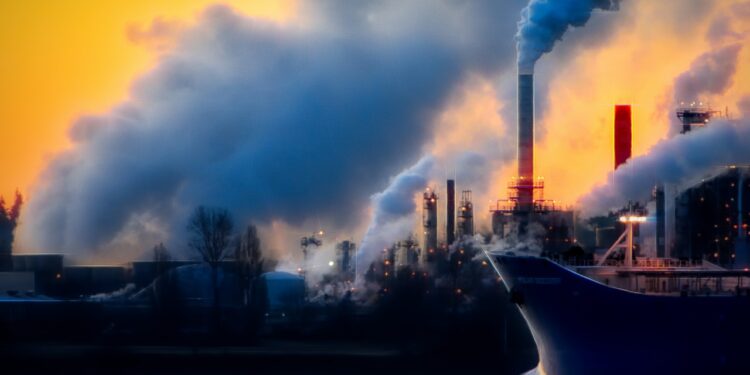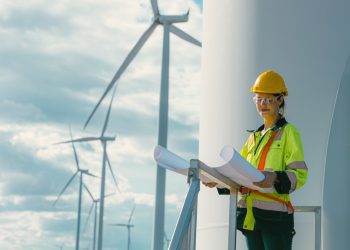When we look out to 2050 and the transformation of the global energy system required to avert the climate crisis, we’re often confronted with what appear to be adversarial choices. In the press, in parliament, on social media, the debate is boiled down to a tussle between technologies. Renewables or nuclear? More supply or less demand? Gas backup or storage? Heat pumps or hydrogen? Green hydrogen or blue hydrogen?
This frustrates me because in reality the challenge is so great that we’re likely to need all of the above, in some form, at some scale or in some place.
But something even more fundamental has been highlighted with the publication of the Energy Institute’s annual Energy Barometer survey of professionals across all walks of UK energy. Those same public debates also too often ignore the one thing all of these technologies will require – skilled people.
Today’s skilled workforce
There are two halves to this story. The Barometer is reassuringly positive about today’s workforce, finding a majority motivated by the climate crisis, already training for net zero, and considering options for moving to and between new clean energy fields.
But there’s a real concern for those parts of the existing highly skilled workforce facing the most change – roles in energy intensive industries, oil and gas production and their supply chains – which are set to change markedly over the coming decades.
There’s a salutary warning in history – the hardships caused by the loss of thousands of coal mining jobs throughout the latter stages of the twentieth century are still felt keenly in communities in parts of the UK.
It’s clear many of the skills and experiences developed in conventional energy can and should be transferred to the construction of the new clean energy system. But there’s a clear danger that the pace envisaged by the low carbon transition could leave some professionals stranded, leading to a growing sense of disconnection between their communities and the wider net zero goal.
The new workforce of tomorrow
The other half to this story is on the horizon. Frankly, today’s workforce isn’t going to be the same one that sees net zero through to its conclusion. My generation will be in its dotage and estimates suggest up to 400,000 new recruits into our industry will be required by 2050, more than half of them into roles that don’t currently exist, many in engineering but also in more diverse disciplines like behaviour change, digitalisation and data.
We often hear about the long lead times involved in building a new power plant. But the lead times required to bring on a heat pump installer or wind turbine engineer – from inspiring interest in STEM in schools through the necessary apprenticeships and university degrees and into the workforce – are as long if not longer.
Leading by example
There’s another reason this matter is pressing here and now. It’s also the vital importance that the UK, as host of COP26 in Glasgow in November, leads by example on this, as an integral aspect of the global net zero agenda.
There are myriad versions of this net zero skills issue facing countries around the world – whether in the OECD, in growth economies or in the Global South. The UK needs to build its own credibility at home if it’s to inspire action from others.
Historically the UK’s energy professionals have led the world, and I hope we can aim for a global role in tackling the climate crisis too. The Barometer identifies export potential in the capabilities needed in offshore wind, CCUS and energy and carbon management – skills that can support other countries as they pursue their own greenhouse gas emissions reductions.
A net zero skills strategy
It’s clear that decarbonisation won’t happen at the necessary speed and scale without the assembly of a mass skilled workforce. And a majority of the Barometer’s respondents want to see their industry and, in particular, the government take action.
So how can we be more certain of having the skilled workforce in the right place at the right time? A plea for stable, long term energy policy is the perennial ask of the industry, and no less so in relation to skills. Incentivising new energy development generates a ‘pull’ – creating commercial drivers to develop the workforce needed to bring forward key technologies.
But more is needed besides – the ‘push’ of a far-sighted net zero skills strategy in which the government works with industry to identify the gaps and plug the leaks in the essential pipeline of diverse new talent, and provide the training opportunities to avoid leaving existing workers behind.
The publication of recommendations from the UK’s Green Jobs Taskforce, which echo these same themes, suggest this is being taken seriously by ministers. It’s going to be critical to our chances of reaching net zero, and the Energy Institute looks forward to playing its full part.
Energy Institute Energy Barometer 2021: https://www.energyinst.org/barometer/2021
By Steve Holliday
About the author: Steve Holliday is President of the Energy Institute.
This article originally appeared at https://www.weforum.org/agenda/2021/08/why-we-need-to-talk-about-the-skills-needed-for-net-zero/ and is republished with permission.












